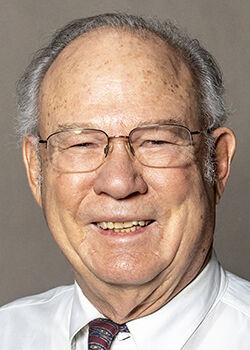
Court rules Eggleston may appeal medical commission’s denial of preliminary injunction
Listen
(Runtime 1:22)
Read
Retired Clarkston Ophthalmologist Richard Eggleston will be allowed to appeal an earlier denial of his motion for a preliminary injunction on a disciplinary hearing against him from the Washington Medical Commission (WMC.)
Eggleston came under scrutiny from the Commission for writing opinion columns he published in the Lewiston Tribune where, among other things, he shared allegedly-inaccurate information about COVID-19, pandemic death counts, ivermectin as a treatment for the virus and vaccines.
On Sept. 28, the Washington Court of Appeals granted Eggleston’s motion for discretionary review after a trial court denied his motion for a preliminary injunction on a disciplinary hearing with the WMC.
The court also rejected the Medical Commission’s motion to modify an emergency injunction granted to Eggleston in May, which keeps the stay on the Commission’s disciplinary proceedings in place while the case moves through the appellate court.
“It is a very important next step. Up until this point, there had been a question about whether the Court of Appeals was even going to hear this,” said Eggleston’s lawyer, Todd Richardson. “We are excited, we’re gratified. And I consider this a significant win for us.”
In her opinion, Commissioner Hailey L. Landrus wrote that two court rules supported Eggleston’s motion for discretionary review.
First, Landrus wrote, the superior court committed, “an obvious error which would render further proceedings useless” by failing to recognize that Eggleston established he would be subject to irreparable injury by participating in a WMC disciplinary hearing.
It also erred, she wrote, by failing to address all three exceptions in a rule the court cited denying his motion for a preliminary injunction.
Second, Landrus wrote, the superior court committed a probable error that, “substantially alters the status quo or substantially limits the freedom of a party to act” in its decision to deny the preliminary injunction.
“Eggleston’s prehearing request for constitutional protection without anyone deciding the merits of his motion to dismiss on constitutional grounds … has an immediate effect upon Dr. Eggleston outside the courtroom,” Landrus wrote. “If, indeed, Dr. Eggleston is entitled to constitutional protection as he contends, the superior court’s decision substantially alters that status quo.”
Richardson said the case could set a precedent for similar lawsuits in different states where medical boards have attempted to discipline doctors who spread contested information in a public forum.
“That is such an important thing, the decision of, ‘Do First Amendment rights apply to a doctor who was speaking in a public forum and not in a doctor-patient privilege?’ ” he said. “The answer to that is going to have effects that affect every doctor, anywhere in this nation.”
That decision is yet to be made, Richardson said. The most recent ruling only allows Eggleston to pursue an appeal.
His co-counsel, Richard Jaffe, is also working on similar cases in other states, Richardson said.
“Rick intends to be showing this ruling to courts in California and around the nation,” he said.
The Medical Commission has until Oct. 30 to respond.















